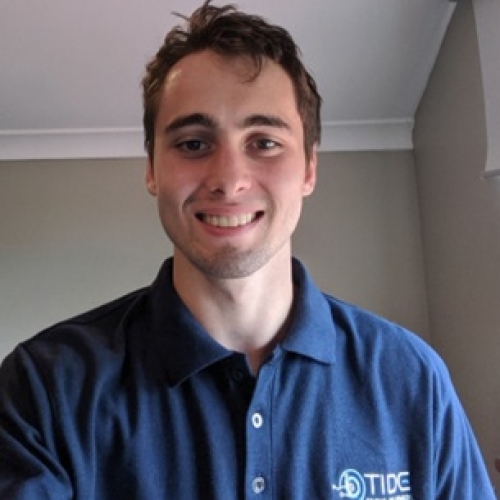
Marcus Dyson
The University of Western Australia
Marcus Dyson is a first year PhD candidate at the University of Western Australia, conducting research in developing methods for modelling ocean waves in association with the TIDE research hub. This project is multidisciplinary, covering numerical solutions to PDEs, Bayesian statistics, and Fluid mechanics. Prior to beginning his PhD in 2024, Marcus was completing the honours component of the Bachelor of Philosophy program (Hons), where he majored in both mathematics and finance. Marcus’s honours research, similar to his current PhD topic involved improving models of phenomena using statistical techniques, specifically of phenomena displaying chaotic dynamics. Currently, Marcus in addition to his other PhD commitments is working to publish his research from his honours year. Outside academia, Marcus enjoys playing piano and doing Karate.
1. Can you give me a quick rundown about the type of mathematics you are studying and its potential impacts for the broader community (think how you would explain your work and studies to others who don’t study maths)
I am studying a combination of applied mathematics and statistics, specifically dealing with modelling real life systems. Often, models that we have of some phenomenon are unable to capture all the relevant dynamics of a system as a result statistical techniques can be used to learn these hidden dynamics. This is important because often systems in the real world are complex and all the relevant nuance of a system may not be able to be captured by a model, but by using some statistical techniques data about the system can be used to infer these hidden dynamics and also provide uncertainty on forecasts of these systems. Examples of systems that we may want to understand would be volcanoes, the weather, the climate, etc. These systems are highly complicated, but there is a great deal of importance in understanding them in order to make effective decisions.
2. How did you get into mathematics/statistics/data science? Was there someone or something that inspired you to this field?
My favourite part of mathematics is how it can be applied to such a variety of different problems. I didn’t know what I wanted to do after high school so I picked math because of how flexible it was. However, over the years I began to cultivate a passion for mathematics as I learned more about the beauty and power of it. Another reason I was drawn to math is that I remember as a kid my Dad showing me all these random math terms with fancy names and these funny looking pictures (I now know as equations) and that definitely left and impression on me.
3. You received a Travel Grant to attend AMSI Summer School 2024. How important was this in terms of your ability to attend, fully participate in the program and meet others studying in similar fields? Do you think it was an advantage to attend the program in-person?
If it was not for the travel grant I likely would not have attended in person. I found the opportunity to collaborate and hang out with the other math students very valuable. I got to learn from the PhD students about PhD life and research and I got exposed to many topics in math, which I knew nothing about. I think that it was to my advantage to attend in person, whether it be for the ease of learning from the lectures or being able to work through problems with other students.
4. What was the most valuable part of the program for you?
The most valuable part of the program was getting to know the other math students and lecturers and the fields they are investigating.
5. In the long-term, what do you think are the benefits of having attended Summer School?
Summer school equipped me with the tools to further pursue my research as a PhD and it gave me a network of mathematicians for future collaboration.
6. Summer School included a special Careers Day program which aims to help give students an idea of the kinds of career paths available to maths graduates in industry and private sector research areas. Do you feel better equipped to explore career options in the mathematical sciences after attending AMSI Summer School?
The summer school career day exposed me to a wide variety of exciting career options. Prior to attending summer school I knew little about math careers. The careers day has equipped me to better pursue careers in the mathematical sciences.
7. What advice would you give to someone who is considering applying for Summer School in 2025? Should they apply and why?
The advice I would give to someone considering applying for summer school would vary depending on their future career plans. However, in both cases I would recommend doing it after their final year of undergrad. The reason for this is twofold: they will be in a better position to understand what math they want to pursue whether for research or for their occupation and there is less pressure to do classes for credit, which depending on the institution the student has come from can be quite risky due to the differences in curricula between universities.
8. What are your current career ambitions in the mathematical sciences sector?
Currently, I am working towards finishing a PhD in 3 years, however after that I am interested in applying my math skills to industry as some kind of consultant.
9. How did connecting with the community at AMSI Summer School support your experience?
It made the 4 weeks considerably more fun than if I sat in my room all day.
